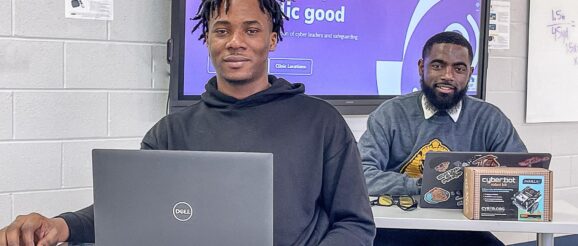How A Cyberattack Led To Innovation At Stillman College

Fortune Linus and Kenyatta Lewis, students active in the Cybersecurity DEI Clinic at Stillman … [+]
Stillman College, located in Tuscaloosa, Alabama, established the Cybersecurity DEI Clinic in response to a 2017 cyberattack that crippled the historically Black institution for nearly a year. Research demonstrates that ransomware attacks cost U.S. colleges and universities more than $9.45 billion in 2021. The attack at Stillman led the community to realize the vast importance of cybersecurity, and the need to build opportunities for students, across disciplines, to learn more about cybersecurity.
Kevin Harris
Kevin Harris serves as the Program Chair of the Department of Computational and Informational Sciences and the Executive Director of Stillman’s Cybersecurity DEI Clinic. According to Harris, “If I were to share a silver lining to the attack, it would be Stillman became the very first Historically Black College operating a university-based cybersecurity clinic under the Consortium of Cybersecurity Clinics, and we are now helping to spread the message of the importance of them to our peers at other HBCUs.”
Cybersecurity is becoming more popular at HBCUs as a major, and 20 HBCUs have created Cybersecurity Leadership Centers with the help of funding from IBM. However, to date, Stillman College is the only HBCU to host a Cybersecurity Clinic. Other universities that host Clinics include UC-Berkeley, MIT, Indiana University, among other majority institutions.
The primary goal of the Cybersecurity DEI Clinic is to increase awareness of cybersecurity, both for individuals interested in pursuing careers in the field and for small business owners in the community. At Stillman College, Harris shared, “We often ask ourselves: How can we support our community with our students? Our student-run clinic takes a unique approach by involving students in hands-on work with organizations in the community. Students work directly with small businesses to provide training and awareness programs, especially for minority-owned businesses and critical infrastructure.”
Coming from industry prior to working as a professor, Harris is aware that small to medium-sized businesses – especially those owned by people of color – are often overlooked in the area of cybersecurity. The Cybersecurity DEI Clinic seeks to bridge this gap. The clinic’s activities not only contribute to the education and training of future cybersecurity professionals but also provide much-needed support to the community. Stillman is also creating a new IT and Cybersecurity Training Center. This center will push forward the same goals as the clinic and provide non-credit courses for members of the community who want to develop skills without seeking a formal degree, providing a flexible and accessible way for individuals to acquire valuable IT and cybersecurity skills.
Researchers at Howard University and the University of Buffalo have found that hands-on work experience while in college in cybersecurity is a motivator for pursuing a career in the area and is especially important for students of color. Having a diverse cybersecurity workforce is essential to creating new knowledge and considering the perspectives of a broad cross-section of the U.S. As an HBCU graduate, Harris knows firsthand that the diversity of HBCUs is something that is highly valuable. As he explains, “From rural to urban, extremely small to large institutions, liberal arts to technical programs, and beyond – there’s such an enriching, broad spectrum of perspectives and experiences across the HBCU system. And bringing our perspectives into the cybersecurity landscape is critical, especially because minorities are still underrepresented in the industry.” Stillman students, and HBCU students overall, bring a strong sense of social awareness and a passion for social justice to the work they do. Harris shared, “Understanding how cybersecurity is connected to social awareness enables our students to better understand the cyber landscape and then to be able to go into the field with that same passion to make it a more well-rounded industry.”
Stillman College students Joshua Lane, Ameerreia Rollins, Galen Miller, and their professor, Kevin … [+]
The projects that students are working on at the clinic are diverse and include close collaborations with local organizations. Students are actively recruiting additional students to join the clinic as well. Of note, the Cybersecurity DEI Clinic just received a $500,000 grant from Google’s Cybersecurity Clinics Fund, and plans to use the funds to expand student teams and expand the clinic model to other HBCUs.
One important aspect of the clinic is its commitment to inclusivity. According to Harris, “Our student cohort comprises a wide range of individuals, including traditional students and non-traditional students who may be working and supporting their families while participating in the clinic. This diversity of perspectives and backgrounds enriches our projects and enhances the overall learning experience.”
The Cybersecurity DEI Clinic and related initiatives have evolved from a cybersecurity attack into a multi-faceted approach to cybersecurity education and community support. Stillman College, and Harris in particular, is committed to preparing students for careers in cybersecurity and enhancing awareness in the community. The institution is contributing to a safer digital landscape and greater community and student resilience.
